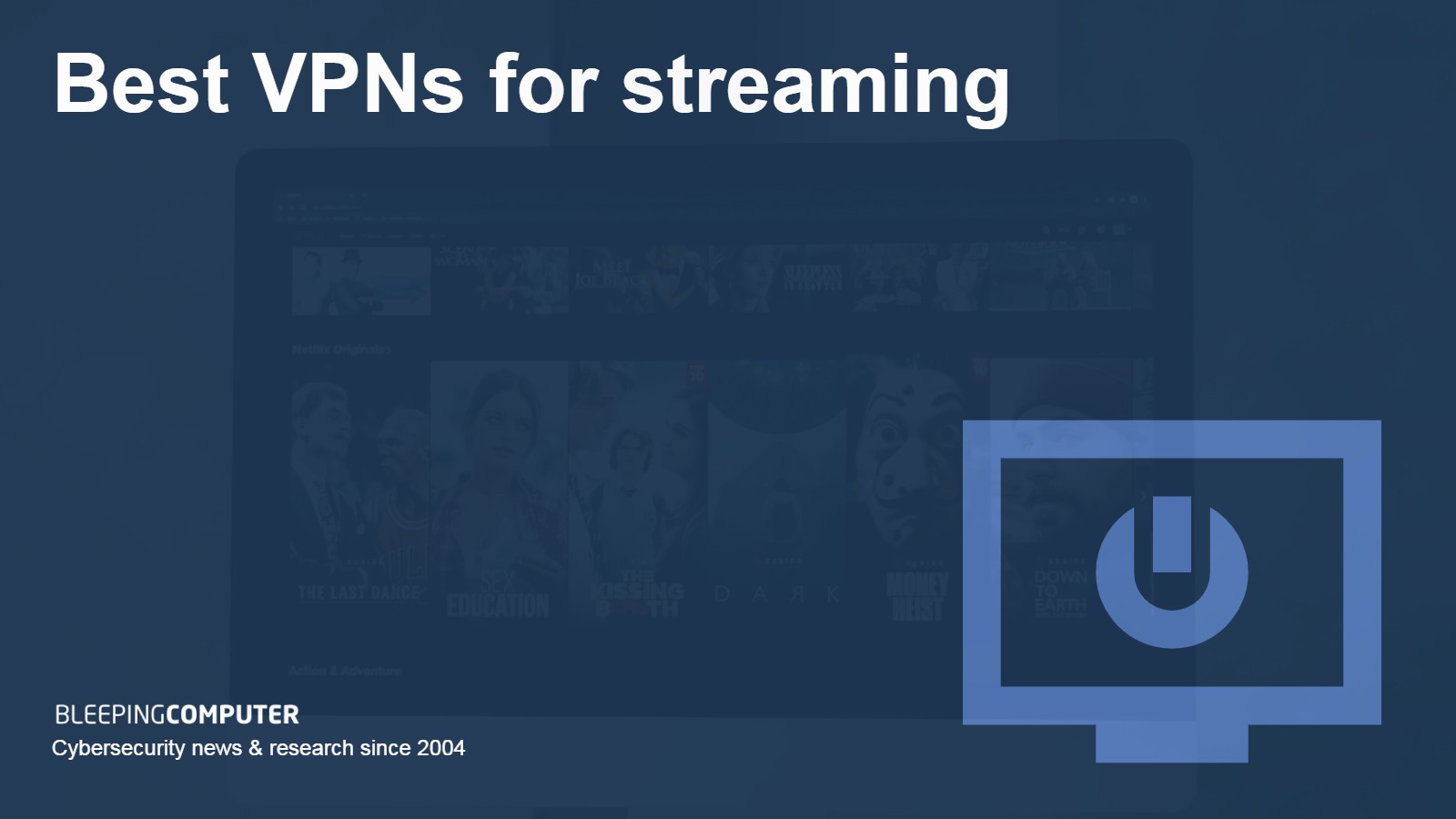The safest and easiest way to access streaming content from another country is to use a VPN. This guide will explain which streaming VPNs are the most reliable, and how to use them.
A VPN allows you to access additional content from your favorite streaming platforms. By connecting to a VPN server in a different country, you can watch titles that are only available in that country. This is particularly useful if you’re traveling abroad and would like to stream video from your home region. The best VPNs work with all major streaming platforms – read our recommendations to avoid the many VPN services that are blocked.
A virtual private network (VPN) allows users to assume the IP address of any server in the VPN provider’s network. It encrypts the traffic flowing between the user’s device and that server, masking it from the internet service provider and any third-party snoops.
We’ll examine individual VPN providers in more detail later. For now, here’s a summary of our top choices.
Best VPNs for streaming:
- NordVPN: Our top VPN for streaming. Works with all major streaming platforms and is fast enough for watching video in 4K. RAM-only servers available in 61+ countries. Plans come with a risk-free 30-day money-back guarantee.
- Surfshark: Best budget VPN for streaming. Allows unlimited device connections and has RAM-only servers in 100+ countries. Easy to access a range of streaming platforms and can rotate users’ IP addresses in-session.
- ExpressVPN: Has a dedicated app for routers and an Onion site on the Tor network. RAM-only servers available in 105+ countries and fast connection speeds. Works well with content libraries from major streaming platforms.
- CyberGhost VPN: Vast server network with very fast connection speeds. Has an audited no-logs policy and issues quarterly transparency reports. Some RAM-only servers are optimized for individual streaming platforms.
- Proton VPN: Servers in 71+ countries and a great option for both streaming and torrenting. Has a stealth mode that enables connections in China, and a VPN Accelerator tool to boost connection speeds.
- Atlas VPN: Provides fast connection speeds and consistently good access to streaming platforms. Subscriptions include unlimited device connections and access to MultiHop servers. Has an audited no-logs policy.
- PrivateVPN: Independent provider with servers in 63+ countries. Works with a range of major streaming platforms and has a stealth mode that can bypass Chinese blocks. Allows port forwarding and up to 10 simultaneous device connections.
Summary Table
| No value | TEST WINNER | No value | No value | No value | No value | No value | No value |
| No value |
NordVPN
 www.nordvpn.com www.nordvpn.com
|
Surfshark
 www.surfshark.com www.surfshark.com
|
ExpressVPN
 www.expressvpn.com www.expressvpn.com
|
CyberGhost
 www.cyberghost.com www.cyberghost.com
|
Proton VPN
 www.protonvpn.com www.protonvpn.com
|
Atlas VPN
 www.atlasvpn.com www.atlasvpn.com
|
PrivateVPN
 www.privatevpn.com www.privatevpn.com
|
| Ranking | 1 | 2 | 3 | 4 | 5 | 6 | 7 |
| Number of Servers | 5,400 | 3,200 | 3,000 | 9,308+ | 3,800 | 750 | 200+ |
| Streaming reliability | Excellent | Excellent | Excellent | Good | Good | Good | Good |
| Streaming Services | Netflix, Amazon Prime, BBC iPlayer, Sky Go, ITV Hub | Netflix, Amazon Prime, BBC iPlayer, Sky Go, ITV Hub | Netflix, Amazon Prime, BBC iPlayer, Sky Go, ITV Hub | Netflix, Amazon Prime, BBC iPlayer, Sky Go, ITV Hub | Netflix, Amazon Prime, BBC iPlayer, ITV Hub | Netflix, Prime Video, HBO Max, Hulu, BBC iPlayer | Netflix, Amazon Prime Video, Disney+, BBC iPlayer |
| Devices Supported | Windows, MacOS, iOS, Android, Linux, Smart TVs, Routers | Windows, MacOS, iOS, Android, Linux, Smart TVs, Routers | Windows, MacOS, iOS, Android, Linux, Smart TVs, Routers | Windows, MacOS, Linux (command line), iOS, Android, Amazon Fire TV | Windows, MacOS, iOS, Android, Linux Android TV | Windows, MacOS, iOS, Android, Linux Android TV, Amazon Fire TV | Windows, MacOS, iOS, Android Amazon Fire TV |
| Avg Speed (Mbps) | 100+ Mbps | 100+ Mbps | 100+ Mbps | 100+ Mbps | 100+ Mbps | 100+ Mbps | 71 Mbps |
| Simultaneous Connections | 6 | Unlimited | 5 | 7 | 10 | Unlimited | 10 |
| Best deal (per month) | $3.09 SAVE 63% + FREE months |
$2.29 85% off 2yr starter plan |
$6.67 Save 49% |
$2.03 SAVE 84% |
$4.99 SAVE 50% |
$1.83 SAVE 83% |
$2.00 SAVE 85% on 3yr plan |
It takes more than the ability to access streaming platforms to make a good VPN – though that does help. When selecting providers, we objectively compare them against a list of specific criteria. These are summarized below, with a more detailed analysis available later in the article.
- Ability to access streaming services and your favorite content
- Large server networks
- Fast connection speeds
- Strong privacy and security features
- Good value for money
- User-friendly apps
- Helpful customer support
To be included as one of our top three providers, we additionally require VPNs to have a RAM-only server network, independently audited software and infrastructure, effective obfuscation, and a location beyond the reach of cross-border spying alliances.
Get a risk free trial
NordVPN offers a risk-free 30-day trial so you can sign up here with zero risk. You can use the VPN rated #1 on this list with no restrictions for a full month.
There are no hidden terms - just contact support within 30 days if you decide NordVPN isn't right for you and you'll get a full refund. Start your NordVPN trial here .
Best streaming VPNs
Now let’s explore each of our recommended providers in a little more detail:
1. NordVPN

NordVPN has established itself as a prime mover in the VPN industry. It can consistently access all of the top streaming platforms. Its MeshNet tool is free for anyone to use, regardless of whether they have a subscription.
The company has its own connection protocol – NordLynx – that is fast enough to stream video in 4K and doesn’t require user data to be stored on its servers. Other security features include 256-bit encryption, one-click access to the Tor network, MultiHop servers, built-in leak protection, a kill switch, and split tunneling.
The company’s SmartPlay tool helps VPN-incompatible devices access region-locked content. Obfuscation helps users bypass VPN blocks in countries like China, Turkey, and Russia.
NordVPN has 6,000+ servers spread over 61+ countries. These have all been RAM-only since a 2018 attack on a third-party data center in Finland prompted a change in company policy. NordVPN is also working toward buying all of its servers and housing them in purpose-built data centers – a process known as colocation.
The company makes well-designed apps for Windows, macOS, iOS, Android, Amazon Fire TV, and Linux. These come with a Threat Protection tool that automatically blocks ads, trackers, and access to malicious websites.
NordVPN has undertaken multiple audits of its server network and software. These have verified that it does not store user data.
Pros:
- Works with popular streaming platforms
- Very fast connection speeds
- RAM-only servers in 61+ countries
- One-click access to Tor network
- Obfuscation enables connections in China
- Audited no-logs policy
Cons:
- Low device connection limit
- Data breach in 2018
BEST VPN FOR STREAMING: NordVPN is our recommended provider. It works seamlessly with streaming platforms and is fast enough for streaming video in 4K. RAM-only servers are available in 61+ countries and plans come with a risk-free 30-day money-back guarantee.
Read our full review of NordVPN.
2. Surfshark

Surfshark combines reasonably priced long-term subscriptions with a range of interesting features. These include GPS-spoofing, in-session IP address rotation, unlimited connections, and access to static IP addresses.
It’s great for streaming, with RAM-only servers in an impressive 100+ countries. Surfshark can access 30+ Netflix libraries and works well with major players such as Amazon Prime Video, HBO, BBC iPlayer, and Disney+. Speeds are easily fast enough for streaming in 4K and its smart DNS service helps devices like smart TVs and games consoles bypass location blocks.
Surfshark adheres to a strict no-logs policy, which has been independently verified through an audit of its server network. The company’s browser extensions have also been independently audited.
Apps are available for Windows, macOS, iOS, Android, Amazon Fire TV, and Linux. These all come with a full GUI, built-in leak protection, and 256-bit encryption. Surfshark’s Nexus technology allows users to specify the entry and exit servers in MultiHop connections, and its Camouflage mode obfuscates traffic so that it can bypass Chinese blocks.
Surfshark merged with Nord Security – NordVPN’s parent company – in 2022. In a press release issued at the time, Surfshark said that it would continue to operate autonomously.
Pros:
- Works with all major streaming platforms
- RAM-only servers in 100+ countries
- Unlimited device connections
- Rotating IP addresses
- GUI for Linux
- Audited zero logs policy
Cons:
- GPS spoofing only available for Android
- No longer independent
GREAT VALUE: Surfshark has RAM-only servers in 100+ countries and speeds fast enough for 4K streaming. Provides easy access to popular streaming platforms and has a smart DNS service available. Plans come with a 30-day money-back guarantee.
Read our full review of Surfshark.
3. ExpressVPN

ExpressVPN provides a consistently secure and reliable service. As such, it’s considered something of a premium brand with subscriptions priced above the market average.
The company has designed its own lightweight connection protocol, which helps ensure the fastest streaming speeds. Additional security measures include reinstalling the operating systems of every server on a weekly basis.
ExpressVPN provides excellent access to a swathe of Netflix content libraries and it works equally well with all of the other most popular platforms. Its MediaStreamer smart DNS proxy helps devices that don’t natively support VPN apps bypass geo-restrictions.
The company has a dedicated Onion site on the Tor network, which makes it easier for those in restrictive countries to sign up. Automatic obfuscation ensures that their traffic can bypass any country-imposed blocks.
Easy-to-use apps are available for Windows, macOS, iOS, Android, Android TV, Nvidia Shield, Amazon Fire TV, and Linux. These come with 256-bit encryption, built-in leak protection, and a Threat Manager Tool. ExpressVPN also makes an app for routers, making it far easier to configure a VPN connection that protects every device on a home network — even those that aren’t compatible with VPN software.
ExpressVPN was bought by cybersecurity firm Kape Technologies in 2021. The purchase was viewed with suspicion by some, given that Kape – under its former name of Crossrider – specialized in the creation of software designed to inject adverts into users’ browsers.
At the time, ExpressVPN said that it would continue to operate independently – just like the other VPN brands owned by Kape. It has since had several third-party audits of its infrastructure and software, which verified its no-logs policy.
Pros:
- Works with all major streaming platforms
- RAM-only servers in 105+ countries
- Onion site available
- Obfuscation enables connections in China
- Audited no logs policy
Cons:
- Relatively expensive
- Owned by Kape Technologies
TRUSTED SERVERS: ExpressVPN makes it easy to access the top streaming platforms and has servers in 105+ countries. Its proprietary connection protocol is open-source and very fast. Plans come with a 30-day money-back guarantee.
Read our full review of ExpressVPN.
4. CyberGhost

CyberGhost VPN is an understandably popular choice for streaming, with very fast connection speeds. Servers optimized for specific streaming platforms skip the trial-and-error approach to finding working servers.
The company has 10,000+ RAM-only servers in 100+ countries. As well as streaming, some of these are optimized for gaming and torrenting. Other CyberGhost VPN features include an automatic kill switch; DNS, IPv6, and WebRTC leak protection; and 24/7 customer support.
So far, so good. However, it’s worth noting that CyberGhost VPN doesn’t provide access to MultiHop servers or obfuscation. Split tunneling is only available for Android, and the Smart Rules tool is only for Windows users.
If you do use the Windows app, Smart Rules enables you to configure your favorite streaming platform apps to automatically connect to the servers optimized for them. You can also specify websites that you’d like to use outside of the VPN tunnel.
CyberGhost VPN apps have a playful GUI and are available for Windows, macOS, Linux, iOS, Android, Amazon Fire TV, and Apple TV. The company has had independent audits of its server network and management systems, which have verified its no-logs policy.
Like ExpressVPN, CyberGhost VPN is owned by Kape Technologies – a company with a somewhat unsavory past. The acquisition occurred in 2017, and CyberGhost VPN has since verified its no-logs policy through independent audits of its server network and management systems. It issues quarterly transparency reports detailing any third-party data requests.
Pros:
- Works with all major streaming platforms
- Vast network of RAM-only servers, including streaming servers
- Very fast connection speeds
- Issues quarterly transparency reports
- Audited no-logs policy
Cons:
- Split tunneling only fully available for Android
- Smart Rules only available for Windows
FAST CONNECTIONS: CyberGhost VPN has very fast connection speeds and RAM-only servers in 100+ countries. It works great with all major streaming platforms and has servers optimized for individual providers. Plans come with a 45-day money-back guarantee.
Read our full review of CyberGhost VPN.
5. Proton VPN

Proton VPN combines superior streaming abilities with a reputation for keeping user data secure. It has servers in 71+ countries, and high-security data centers in Sweden, Switzerland, and Iceland, through which it routes sensitive traffic.
It can access streaming platforms such as Netflix, BBC iPlayer, ITVX, Peacock, and HBO. Connections are fast, thanks in part to the company’s VPN Accelerator tool, which routes traffic more efficiently using a modified version of OpenVPN.
Proton VPN apps are available for Windows, macOS, iOS, Android, Android TV, and Linux. They are all open-source and include one-click access to the Tor network, as well as leak protection, split tunneling, and a kill switch.
Port forwarding is allowed, which is great for torrenting as it lets users connect to more peers and improves both download and upload speeds. The Proton VPN stealth mode disguises VPN traffic as regular internet traffic and is effective in evading VPN blocks in countries like China.
The company protects user data with either ChaCha20 or 256-bit AES encryption, depending on the connection protocol being used. It has undergone independent audits of its software and infrastructure, which have verified its no-logs policy.
Subscribers can connect up to 10 devices simultaneously. In addition, Proton VPN can be installed on a router, which protects every device in the user’s network while only using one of the allocated connections.
Pros:
- Great for streaming
- Fast connection speeds
- Open-source apps
- Works in mainland China
- Tor-optimized servers available
Cons:
- Relatively small server network
- No auto-connect feature
STRONG ON PRIVACY: Proton VPN provides access to a range of streaming platforms in 71+ countries. The service works in China and provides one-click access to the Tor network. Apps are open-source and subscription plans come with a 30-day money-back guarantee.
Read our full review of Proton VPN.
6. Atlas VPN

Atlas VPN arrived in 2020 and was bought by Nord Security a year later.
It's strong on security and a great choice for streaming. Atlas VPN has fast connection speeds and streaming-optimized servers that work with popular platforms such as Netflix, Amazon Prime Video, Disney+, Hulu, and BBC iPlayer.
Subscriptions include unlimited device connections and provide access to the speedy WireGuard connection protocol – though IPSec/IKEv2 is also available. Atlas VPN’s SafeSwap technology enables MultiHop connections with randomized exit servers, as well as being able to rotate users’ IP addresses in-session.
Apps have a pleasingly minimalist appearance and are available for a range of platforms, including Windows, iOS, Android, macOS, Android TV, and Amazon Fire TV. All apps come with DNS and IPv6 leak protection; and a kill switch that stops the flow of internet traffic if the VPN connection drops out. They also offer a tracker-blocker, a data breach monitor; and split tunneling, which allows users to specify which apps use the VPN tunnel and which connect to the internet normally.
Atlas VPN protects users’ traffic with ChaCha20 encryption for WireGuard and 256-AES encryption for IKEv2. Its no-logs policy has been verified through independent audits.
Pros:
- Works well with major streaming platforms
- Fast connection speeds
- Unlimited simultaneous connections
- MultiHop servers available
Cons:
- Based in the US
- Not independent
- No router support
STRONG ON SECURITY: Atlas VPN provides excellent access to streaming platforms and connection speeds fast enough for streaming video in 4K. Subscriptions include unlimited device connections and come with a 30-day money-back guarantee.
Read our full review of AtlasVPN.
7. PrivateVPN

PrivateVPN is an independent provider that offers a good alternative to some of the more corporate services available.
It works with a range of streaming platforms, including Netflix US, Amazon Prime Video, Sling TV, BBC iPlayer, ITVX, Disney Plus, and Hulu. Connection speeds are fast enough for streaming 4K and the company has servers in 63+ countries.
PrivateVPN is a good option for torrenting as it allows port forwarding and provides access to P2P-optimized servers able to cope with large file transfers.
Apps can be used with up to 10 devices simultaneously, and are available for Windows, macOS, iOS, Android, and Amazon Fire TV. They come with features such as app-specific and system-wide kill switches, protection against IPv6 and DNS leaks, and access to a SOCKS5 and HTTP Proxy. Users in China can get connected too, thanks to a stealth mode that can bypass the country’s blocks.
The level of encryption used on subscriber’s data can be changed from 256-bit to 128-bit for faster speeds when security isn’t paramount. Users can also choose between connection protocols, including OpenVPN with UDP/TCP, L2TP, IPsec, PPTP, and IKEv2.
PrivateVPN has never had a data breach and adheres to a strict no-logs policy – though this has yet to be independently audited. The company is based in Sweden, which has commendable privacy laws. This can get a little muddied by its also being a member of the SIGINT Seniors Europe international intelligence-sharing alliance.
Pros:
- Great for streaming your favorite movies and more
- Decent connection speeds
- Port forwarding enables better seeding
- Stealth mode bypasses Chinese blocks
Cons:
- Small server network
- Privacy policy not audited
STEALTH MODE: Independent provider with solid access to streaming services. It has servers in 63+ countries, allows port forwarding, and its stealth mode enables connections in China. Plans come with a 30-day money-back guarantee.
Read our full review of PrivateVPN.
Methodology for choosing the best VPNs for streaming
While there are plenty of VPN companies claiming to offer access to major streaming services, very few live up to their promises. Fewer still have all the features necessary to provide a quality day-to-day service. To sort the good from the bad, we test providers on a number of fronts using our testing methodology.
- Ability to access streaming services: Major streaming platforms are adept at identifying and blocking servers in data centers known to be used by VPNs. We regularly test which VPN providers work with the content libraries of popular streaming services such as Netflix, Amazon Prime Video, and Discovery+.
- Large server networks: VPNs with servers in a wide range of countries make it easier to access new content libraries. Those with multiple servers within each region provide more options for establishing a working connection while also more evenly distributing network traffic.
- Fast connection speeds: We all want the option to stream in 4K when available, which is why we try to find the fastest VPNs by regularly speed-testing providers. At the very least, we require that VPNs can stream HD video without buffering.
- Strong privacy and security features: Although the ability to access new streaming content is easy to market, VPN providers should always prioritize protecting customers’ data. As a bare minimum, we require that providers offer 256-bit encryption, a kill switch, leak protection, and a strict no-logs policy. Ideally, they should also provide access to MultiHop servers, obfuscation, split tunneling, and port forwarding. This will help to improve online privacy, even if the plan is to access geo-blocked content.
- Good value for money: We like VPN providers that represent good value for money at a range of price points. Those that we think charge too much for the level of service on offer are rejected.
- User-friendly apps: Anyone interested in VPNs primarily for streaming will want to get connected with the minimum of fuss. We therefore look for providers with apps that can be navigated intuitively. This requires a well-designed GUI and availability across a range of operating systems.
- Helpful customer support: The better VPN providers will be able to help anyone struggling to connect to a particular streaming platform. We prefer those who can do this via 24/7 live chat and through reference to detailed and up-to-date knowledge bases.
Bonus points
To make it to one of our top three positions, VPN companies must additionally offer the following features:
- Access to China: China's advanced VPN-blocking system renders the majority of VPNs ineffective or only sporadically functional. Those that do still work – of which there are very few – are highly valued by anyone trying to get online in any country where internet use is restricted.
- Diskless servers: The better VPN providers use RAM-only servers, which means that all data on the server is lost the moment it is powered off or rebooted. This is preferable from a security standpoint, as it means that the server has no data to give up if compromised.
- Incorporation outside the scope of intelligence alliances: Numerous countries engage in intelligence-sharing networks, with the most well-known being the Five Eyes alliance. While domestic laws often prohibit countries from directly spying on their own citizens, members of these alliances can request that their partners conduct surveillance on their behalf. The resulting information is then accessible to all participating countries. To avoid being co-opted, the best VPNs incorporate their companies in countries beyond the jurisdiction of intelligence alliances.
- Audited software and infrastructure: On more than one occasion, a so-called "zero logs" provider has been found to have kept records of customers’ online activities – which they have willingly passed on to law enforcement agencies. In response, the better quality VPN providers now verify their no-logs claims by bringing in third-parties to audit their software and infrastructure. This has the additional benefit of identifying any vulnerabilities that could pose a threat to security.
How to use a VPN for streaming
It’s easy to use a VPN to access content from your home country while traveling abroad. Just follow these steps to connect to your preferred streaming platform.
- Choose a VPN that is able to bypass streaming platforms’ blocks. Many claim to have this ability, but few are able to deliver. NordVPN is a consistently good option.
- Sign up for a subscription. Longer terms are almost always cheaper.
- Download and install the relevant app for your device.
- Restart the device once installation is complete.
- Open the newly installed app and choose a server to connect to. The chosen country should match that of the region intended for the streaming content you wish to view.
- Click the “connect” button.
- Wait until the app informs you that a connection has been established.
- Open the streaming app and play the previously region-locked content.
VPN not working for streaming? Here’s what to do
You may find occasionally that you can’t connect to the home library of your favorite streaming provider while traveling abroad. This is usually relatively easy to resolve. Try the following:
- Connect to a different server. Most VPN providers have multiple servers in the same region. Try each of these until you find one that works. Once you establish a working connection, favorite the server so that you can easily find it again.
- Contact the VPN customer support team. Getting in touch with your chosen VPN provider can be a quick way to find out which servers work with particular streaming platforms.
- Disable IPv6. You may be using a VPN that leaks your IPv6 address, and in turn your real location. To disable it in Windows, open Control Panel > Network and Internet > Network Connections. Click on the WiFi Status Icon and then “Properties”. Make sure the box next to “Internet Protocol Version 6” is unchecked. For macOS, open System Preferences > Network. Select your current network and then click “Advanced”. Set “configure IPv6” to “Off”.
- Clear your cookies, hosted app data and cache. The streaming platform may be able to see previous failed attempts to connect that have been stored in a cookie or browser cache.
- Turn on leak protection. You may need to enable DNS leak protection in the VPN app, if it’s not on by default. Use a service like dnsleaktest.com to confirm that there are no leaks.
- Try watching in a browser. Streaming providers’ apps are better at blocking VPNs because they are able to ensure that DNS requests go to the nearest server rather than through the VPN’s DNS servers. If a mismatched location is subsequently identified, access is blocked.
- Change the time zone of your device. Matching it to the country of the VPN server you’re connecting to prevents the streaming platform registering disparities.
Can I use a free VPN for streaming?
Free VPNs will not work with popular platforms like Netflix and Amazon Prime Video. These platforms have invested a lot of time and money into blocking VPNs. The majority of subscription-only VPNs struggle to evade these blocks, so it’s unreasonable to expect resource-poor providers of free VPNs to be able to do so.
Even if they were to somehow gain access, free VPNs tend to have small server networks that easily become overloaded. Some are forced to operate a queuing system to manage congestion, while others will simply refuse connections. You're likely to face buffering issues, due to slower average speeds and fewer server locations to pick from.
The biggest problem with free VPNs is that they pose a risk to privacy and security. Most have some form of logging policy and may sell collected user data to third parties. The worst providers fail to encrypt internet traffic and leak users’ IP addresses. Some act as vectors for malware thanks to ongoing unpatched vulnerabilities. Any of the reliable streaming VPNs we've mentioned offer privacy tools and excellent security features.
Best VPNs for streaming – FAQs
Is it illegal to use a VPN for streaming?
No, but you may be violating the platform's terms of service by accessing content from outside your region. When streaming companies buy content, they only pay for it to be shown in countries where it is most likely to get the most viewers. To uphold their part of the deal, they need to stop that content from seeping across borders.
Most platforms will stipulate that subscribers risk having their accounts restricted, suspended, or even terminated if found to be using a VPN to access region-locked content. In practice, streaming platforms will simply block access, with a resulting error message.
Which streaming platforms can I watch with a VPN?
You can potentially access any streaming platform with a VPN, provided that the VPN company has a server in one of the countries where the streaming platform operates.
You’ll need a subscription for the majority of streaming services. Free platforms such as Tubi exist, but they are few and far between. Luckily, the streaming industry is highly competitive so most subscription-based services offer seven-day free trials. It’s a good idea to make use of these before signing up to a long-term subscription. This allows you to test whether you’re happy with how the platform works with your chosen VPN.
If you already have a subscription to a streaming platform, you can work it the other way round and make use of the VPN’s money-back guarantees to test-drive particular services.
Some of the best subscription-only streaming platforms include:
- Netflix
- Amazon Prime Video
- Hulu
- Discovery+
- Britbox
- Showtime
- BFI Player
- Curzon
- Paramount+
- Disney+
- ESPN+
- Apple TV+
- HBO Max
- The Criterion Channel
- Pantaya
- Spuul
- Shudder
- Now
- Kocowa
Can I use a VPN for streaming on a smart TV or games console?
You can, but not directly. You’ll first need to configure a VPN connection on your router, which isn’t as difficult as it may sound. The top VPNs in our recommended provider list are all compatible with a range of routers and provide detailed instructions on how to establish a connection. Once up and running, every device on the router’s network is protected and will assume the IP address of the chosen VPN server. This enables connected devices like smart TVs and games consoles to bypass geo-restrictions.
Alternatively, you can use a smart DNS proxy service from a provider like NordVPN, Surfshark, or ExpressVPN. It’s important to note that smart DNS services don’t encrypt traffic as with a VPN.

Post a Comment Community Rules
You need to login in order to post a comment
Not a member yet? Register Now